By Sinead Carew
(Reuters) - A seven-day selloff of U.S. biotechnology stocks has hit sector investors - especially hedge funds - hard. But some managers say it was overdone and are already eyeing bargains such as Gilead Sciences Inc (O:GILD) and Amgen Inc (O:AMGN).
The Nasdaq Biotechnology index (NBI) has fallen 18.7 percent over the last seven sessions as investors took flight after Hillary Clinton, front-runner to be the Democratic nominee in next year's U.S. presidential election, vowed on Sept. 21 to take steps to curb high drug prices. Since its July 20 high, the index has fallen around 27 percent.
The selloff was exacerbated by general market volatility as investors have been grappling with uncertainty about when policy makers will raise U.S. interest rates and concerns over the global economy.
Biotech stocks, which had risen 31 percent this year to their July high after annual increases for the last six years, were also in sellers' sights because they had become richly valued. And the selling was intensified as investment managers did not want to issue third quarter reports showing big holdings in a beaten-down sector.
"What you're seeing is that generalist money is getting very worried and thinking that maybe the healthcare trade is over and they're rotating into something else," said John Fraunces, co-portfolio manager of the $137 million Turner Medical Sciences Long-Short fund in Berwyn, Pennsylvania.
Health-focused hedge funds including Baker Brothers Advisors, Healthcor Management, Palo Alto Investors, and Deerfield Management are each nursing losses of more than 10 percent for September based on their publicly disclosed portfolio at the end of June, data calculated by industry tracking firm Symmetric IO show.
Symetric data points to broad holdings of specialty biopharmaceutical company Horizon Pharma (O:HZNP), which has tumbled 47.3 percent in the last 7 days and which was listed in six hedge fund portfolios.
The stock was a big holding for Deerfield, which manages $7.5 billion, for Healthcor, which oversees $2.6 billion, and for Broadfin Capital, which has held the stock for nearly two years. Horizon Pharma's losses also weighed on Iguana Healthcare Management.
At the same time, a sharp drop in pharmaceutical company Valeant (N:VRX) (TO:VRX) weighed on a number of hedge funds, including prominent activists Pershing Square Capital Management and Jana Partners.
A lot of selling took place in healthcare ETFs such as the iShares Nasdaq Biotechnology EFT (O:IBB), which fell almost 19 percent in the last seven days with an average daily trading volume that was 1.6 times higher than its 50 day average.
NIBBLES AROUND THE EDGES
In the options market, most of the activity was still on the side of expecting further declines, with protective puts outweighing other biotech index trades. But some traders appear to have been snapping up call options in hopes for a sharp rebound, said Jim Smith, options strategist at OTR Global.
"People who are in the sector are looking for hedges and people who are not in it are looking for bargains," he said.
Fraunces has been shorting the ETF, but now he and other investors are already eyeing bargains in the sector. He has been moving money to companies including Horizon Pharmaceuticals, one of the biggest casualties in the biotech sell-off.
Some big name stocks, such as Gilead, Amgen, Biogen Inc (O:BIIB) and Celgene Corp (O:CELG) have sold off sharply enough to make their valuations attractive, according to several investors.
Gilead's forward valuation of 8.1 is now less than half its 10-year median of 16.7 and its competitors' average valuations of 14.4. Amgen's forward P/E is 12.5 compared with an average valuation of 16 for its peers. Meanwhile the S&P 500's forward P/E was 15.4 on Tuesday, according to Thomson Reuters data.
"That's pretty unusual because the absolute growth rate for those companies is two to three times higher than the S&P," said Sven Borho, founding general partner and fund manager at health science investment specialist Orbimed Advisors LLC, in New York.
High valuations prompted Seattle-based Smead Capital Management to cut biotech and pharma holdings in its $1.2 billion Smead Value Investor fund in the last 18 months to 16.5 percent from 29 percent, Tony Scherrer, director of research said.

But Scherrer, now interested in Amgen and Gilead, described the last week's ETF trading as "throwing out the baby with the bathwater."